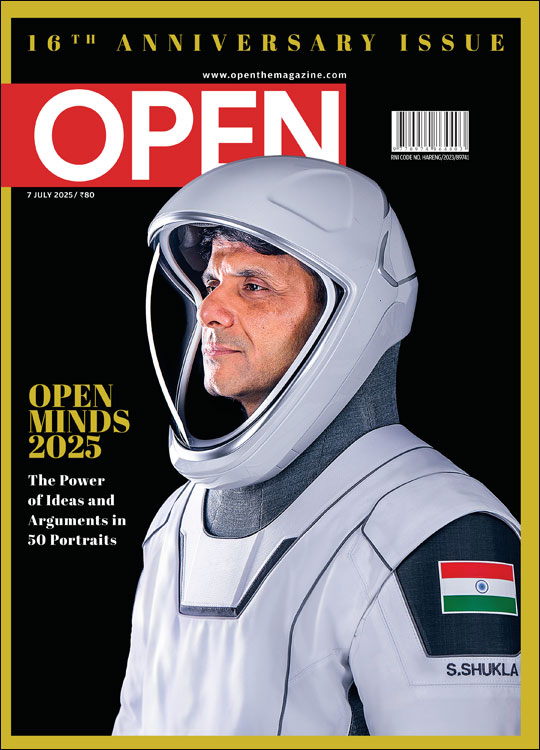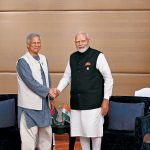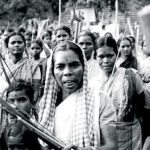Didi & Didis
The new gender renaissance in Bengal politics has a rich backstory
 Sunanda K Datta-Ray
Sunanda K Datta-Ray
 Sunanda K Datta-Ray
|
11 Apr, 2019
Sunanda K Datta-Ray
|
11 Apr, 2019
/wp-content/uploads/2019/04/Didi1.jpg)
BHARATI RAY, HISTORIAN and former Rajya Sabha member, calls her “Saudamini Sahosini”, Saudamini the Brave. Saudamini Gupta (née Khastagir), my great-grandmother, stirred a storm in the teacup of the small world of educated and enlightened Bengalis by refusing to cower behind a screen during the Brahmo Samaj services in Acharya Keshub Chunder Sen’s house. An outraged chronicler thought it was ‘odious and indecorous’ to flout purdah. Undaunted, she and her fellow rebels insisted on sitting on the seats for all and sundry with no division of sex or class.
That was in 1872. Bengal has forged ahead since then, dragging India, including a reluctant cow belt, with it. The daughters of the revolution that germinated in the 19th century have girded their saris to battle for more than the 42 Lok Sabha seats that are ostensibly at stake. For or against the raging dragon that is Mamata Banerjee, they are fighting for the imperilled soul of a secular, liberal India that prizes the rich diversity that Lal Krishna Advani has only suddenly discovered. “This is an election to save the very essence of India, its Constitution, its institutions and the tolerant principles on which it was founded,” says Trinamool Congress’ Krishnanagar candidate, Mahua Moitra, a US-trained investment banker from London who has filed three petitions in the Supreme Court against Narendra Modi’s proposal on a social media hub for online surveillance. The real danger lies nearer to home for Bharati Ghosh, the no less globe-trotting former police officer who has dyed her Trinamool green to a deep saffron. “Democracy has to be restored in West Bengal,” demands the Bharatiya Janata Party candidate.
These women are probably more talented than my ancestor. They are certainly better trained. When it comes to bravery, however, there may be little to choose between social and political defiance. Both indicate frontiers to be conquered, realms to be preserved. The Hindi heartland capitulated five years ago. The south can retreat into itself. The Northeast has never regarded Central affiliation as more than a flag of convenience, and now fears the Citizenship (Amendment) Bill would impede the old game of ‘Bongal Kheda’, the local term for ethnic cleansing. Bengal is the last line of defence.
Nusrat Jahan, 29, model and actress, a Muslim girl who portrays Hindu women on the screen with utter conviction and dances gaily to the tune of Joy Durga Ma, is as much the face of the future as Saudamini Sahosini was in 1872. Her friends say Trinamool’s accomplished and attractive young candidate from Basirhat is also a dab hand with oil and canvas but that’s a skill she doesn’t publicise. Glamorous Mimi Chakraborty, another film novice in the field, is contesting the Kolkata suburb of Jadavpur where as an idealistic young crusader, Didi herself tilted at the windmill of power in 1984 and brought down the formidable Somnath Chatterjee. Trinamool’s two older actresses, Satabdi Roy and Moon Moon Sen (quaintly listed as ‘Sreemati Dev Varma’), are sitting members. I would have hesitated to say a word that barely denoted respectability in Saudamini’s time. But Moon Moon used it first. “Having been a star, I can call myself an actress!” she laughed at my surprise. She may have retired from the silver screen but like her mother, the Greta Garbo of Indian cinema, remains a star.
The daughters of the revolution that germinated in the 19th century have girded their saris to battle for more than the 42 Lok Sabha seats that are ostensibly at stake
Sajda Ahmed is a dedicated social worker. Mamata Thakur is a religious mother of the Matua Mahasangha community. Pratima Mandal quit the civil service for politics. There are many others, each distinguished in some way, an exceptional woman with a particular right to attention. Together, they belong to a tradition of woman power peculiar to Bengal that reaches back beyond Rani Rashmoni (1793-1861), pauses briefly by Saudamini Sahosini, and embraces such modern stalwarts as Matangini Hazra who was shot dead in 1942 and the revolutionary Manikuntala Sen. Mausam Noor, a trained solicitor, is defending the family stronghold in Malda. Her uncle, the late ABA Ghani Khan Chowdhury, once aspired for chief ministership. For all the white-gloved retainers in his Malda mansion, Barkat (as he was known) was a simple man on whom his descent from Bengal’s legendary Baro Bhuyians (Twelve Landlords), who resisted Mughal rule, lay lightly. I had to advise him once not to claim Saudi ancestry which reeked of oil money because his own Afghan lineage was much more august. Mamtaz Sanghamita, sitting member for Bardhaman-Durgapur, also comes of illustrious stock. Her father, the CPM’s Syed Abul Mansur Habibullah, a respected Vidhan Sabha Speaker, was the only Muslim I have known to wear a dhoti pleated down the front in the Bengali Hindu way. True to the Mamtaz-Sanghamita combination of her name, the 73-year-old gynaecologist trained in Kolkata and London reflects her long-dead father’s ecumenism.
Saudamini Sahosini would have approved of these carriers of a flag she only had the opportunity to touch. When Keshub Chunder dilly-dallied over the demand for free and open seating, her father, Annada Charan Khastagir, and his friends moved the weekly prayers to his house. More problems cropped up when Keshub Chunder opposed girls going to university or even studying subjects like geometry, logic and philosophy that were taught in classes in his house. The modernists went ahead nevertheless, and Sivanath Sastri, scholar, religious reformer, educator, writer and historian, who taught there, called Saudamini one of his best pupils. “It was indeed a pleasure to teach these ladies, who were very eager to learn.”
That spirit of inquiry cuts across party lines. Two distinguished women candidates— Bharati Ghosh who has already been mentioned and Mita Chakraborty— are from the Congress. Shashi Tharoor’s protégé, Chakraborty is a computer engineer who has worked in Switzerland and Britain, and “successfully served clients across Europe, Asia-Pacific and the US”. She is locked in a four-cornered fight for the South Calcutta seat with Trinamool’s powerful and popular municipal councillor, Mala Roy, and the Marxist Nandini Mukherjee whose grand ambition is to get Mamata Banerjee, herself a constituent, to vote for her. So far, she hasn’t even been allowed to set foot in the street where Didi lives. The fourth contestant, yet another scion of Subhas Chandra Bose’s family, represents the BJP whose candidate pushed up the vote from 4 per cent to 26 per cent in 2014. Behind him loom the awesome figures of Narendra Modi, who never stops thundering against Didi, and Amit Shah, whose harping on 23 Bengal seats sounds to many like baying at the moon.
Not having a family in the conventional sense and not running a household either, Didi may not realise that the more-the-merrier principle doesn’t always apply
Without linking Bose’s Germany and Japan with the Rashtriya Swayamsevak Sangh, Moitra accuses the BJP of plotting to turn “India into an Orwellian state, where personal freedom and liberties are irrelevant in the face of some larger devious master plan that the Centre wishes to execute”. Once dubbed ‘Memsahib’ by Bengali newspapers, Moitra was reportedly involved in a scuffle with a policewoman at Silchar airport last year. In some respects, she and Bharati Ghosh, the controversial former IPS officer, complement each other. Trained at Harvard and London School of Economics, Ghosh has served in the UN peacekeeping forces in Chad, Congo and Kosovo. The unprecedented police raid on her house, recalling Juvenal’s Quis custodiet ipsos custodies? (Who will guard the guards?), may have been another manifestation of the factionalism that riddles Trinamool. Scams and scandals topple and jail politicians, and Satyajit Biswas, a young MLA, was gunned down in February at a Saraswati puja pandal. Like Sirimavo Bandaranaike, Biswas’ widow, Rupali, is Trinanmool’s candidate from Ranaghat.
Players alone don’t hit the headlines. Some women are anxious for a bit of the limelight. Roopa Ganguly, an actress aligned with the BJP, was possibly trying to counter Didi’s notoriously insensitive dismissal of a well-documented rape by saying that crime was so bad in Bengal no woman could survive 15 days without being violated. More recently, another actress, Koena Mitra, who plays a bar dancer with a reputation in Apna Sapna Money Money, got just about everything wrong when she warned that the “Pakistan” flags out to greet Rahul threatened another partition. The flags were of the Indian Union Muslim League. They weren’t for Rahul but for a Kerala minister, PK Kunhalikutty. The picture was taken in 2016 in Kozhikode and not recently in Wayanad. But Mitra’s rant about “terrorist” Jinnah and Rahul being “pro-jihad and anti-jawans, anti-India” should have appealed to the Sangh Parivar. “Somebody is working hard for ‘Ghazwa-e-Hind’ [India’s Islamic conquest],” she concluded. Mitra didn’t get a BJP ticket.
Not having a family in the conventional sense and not running a household either, Didi may not realise that the more-the- merrier principle doesn’t always apply. Her boast that while everyone is talking about 33 per cent reservation for women, Trinamool has nominated 41 per cent overlooks a pitfall which Mulayam Singh Yadav, experienced in being upstaged and outwitted, wouldn’t have missed. Having famously cautioned wannabe Indira Gandhis—“If everyone joins politics, who will make the chapaatis?”—he would have warned that Bengal will starve if all the 17 Trinamool women and the 20 or so representing the BJP, Congress and Communists are elected. It may be a coincidence that daughter-in-law Dimple, wife of the son who deposed him, already a two-time MP, is now contesting again.
Whatever their politics, Saudamini would have approved of these women who combine career with housekeeping and still wear traditional clothes. ‘If a Bengali person dresses like the English and frequents their society, they engage in reviling the Bengali in front of him, which he has to listen to with patience,’ she wrote in the influential journal Bamabodhini Patrika. ‘Such clothes also deprive one of full acceptance among one’s own people.’ Hers was an age of sartorial innovation. Some women pleated their saris at the back to resemble a European bustle. Some draped a shawl artfully over a long skirt to make it look like a sari. European department stores like Hall and Anderson and Whiteaway Laidlaw sold ready-stitched sari-dresses. Only a few women went the whole hog and donned frocks like the wife and daughters of WC Bonnerjee, the first Congress president. They had to, wrote Bonnerjee’s daughter, because a respectable Bengali woman in a sari didn’t appear in public at all. Sari-wearers stayed at home. That created its own discomforts. Mrs Bonnerjee could not be seen leaving her house in a sari. She could not arrive at her mother’s or mother-in-law’s in a dress. ‘She solved this problem by taking a sari with her in the carriage, drawing down the blinds and changing on the way, so as to arrive clad in a sari and barefoot.’ The ritual was reversed on the return journey.
Saudamini stayed with the sari (albeit modified to today’s ‘Brahmika’ version) to the surprise of her ICS husband’s European junior, who commented, “She has not adopted the English style of dress, but wears a very tasteful native costume.” He found her “very pleasant to talk to; she knows English very well”, adding that “although a Hindu, [she] goes out into society a little”. He meant she mixed with Europeans, which was considered advanced to the point of audacity. The progressive in Saudamini Sahosini would have recognised other Sahosinis not only in Didi and the 17 women she is fielding but also in all the other women who have taken to the political field under rival colours. Theirs is the Bengali heritage of Durga—warrior, queen and mother goddess.

/wp-content/uploads/2025/06/Cover-OpenMinds2025.jpg)













More Columns
Puri Marks Sixth Major Stampede of The Year Open
Under the sunlit skies, in the city of Copernicus Sabin Iqbal
EC uploads Bihar’s 2003 electoral roll to ease document submission Open